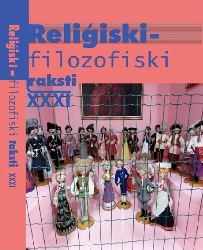“Have We Not Lived In Darkness?”: An Epistemological Dimension of ‘Soviet Spirituality’ in Latvia (1964–1991)
“Have We Not Lived In Darkness?”: An Epistemological Dimension of ‘Soviet Spirituality’ in Latvia (1964–1991)
Author(s): Māra KiopeSubject(s): Epistemology, Government/Political systems, Politics and religion, Post-War period (1950 - 1989), History of Communism, Sociology of Religion
Published by: Latvijas Universitātes Filozofijas un socioloģijas institūts
Keywords: ‘Soviet spirituality’; Homo Sovieticus; socialist rituals; masses’ mood; Latvian SSR;
Summary/Abstract: The title of the article uses a paraphrase of the lyrics of a popular Latvian song of the late Soviet-era. It tells that the life of the people during the Soviet era took place in spiritual darkness, but in spite of that, resistance was burning in Latvian culture. To a large extent, this has been determined by the European cultural heritage, which was characteristic of the pre-war Latvian state. During the Soviet regime, it allowed to escape identification with the Soviet civilization. Unlike many studies on Soviet reality in the fields of economics, politics, history, ideology and sociology, the project currently carried out by the Institute of Philosophy and Sociology of the University of Latvia (LZP-20202_0058) which includes this article focuses on the study of ‘Soviet spirituality’. A serious research problem is the definition of the concept of ‘Soviet spirituality’, as Soviet science has never explained the concept of ‘spirituality’. In the 1960s, in order to distance itself from the old Stalinist totalitarianism, the Communist Party began to pay special attention to spiritual values. However, ‘Soviet spirituality’ cannot be reduced to the everyday manifestations, to some research in psychology, or to ideology, because it is undoubtedly related to the realities that fall within the competence of theology, religious studies, and philosophy. Namely, the creation of a new Soviet man who would have abolished the constant human anthropological nature, the conversion of a priori religiosity into idolatry, the use of feelings and emotions to create a controlled mood in society, rituals and initiation practices to legitimize the existing power structures. The article proposes cognitive theory as the most appropriate methodological tool for describing the phenomenon of ‘Soviet spirituality’. Thus, cognitive theory provides an approach to understanding spirituality, and allows explaining the resistance of Latvian culture to Soviet identification. Theoretical equipment is applicable to case studies, as they clearly reveal the nature and contradictions of ‘Soviet spirituality’ in Latvia.
Journal: Religiski-filozofiski raksti
- Issue Year: XXXI/2021
- Issue No: 3
- Page Range: 232-256
- Page Count: 25
- Language: English

